Search titles
Displaying results 51 to 60 of 203.

Confronting Fiji Futures »
Edited by: A. Haroon Akram-Lodhi
Publication date: January 2016
Fiji, post-independence, has seen several governments, two military coups and, amidst sweeping social, economic and political changes, the presence of divisive identity politics in its journey towards a united, collective Fiji community.
This republished edition of Confronting Fiji Futures takes in these landmark events and eventualities, and aims at a forward-looking assessment of the realities facing Fiji in the present and the future. It focuses on the period of the coups up to and including the 1999 general elections, when an explicitly multiethnic party won government in a surprise landslide result.
This book is the result of a collaborative research project based at the Institute of Social Studies, The Hague, in the Netherlands — an institution with a long tradition of collaborative teaching, research and advisory services in the South Pacific region. It aims to present a range of relevant issues from a number of vantage points. It has brought together a strong diversity of authors led by A. Haroon Akram-Lodhi, including John Cameron, Ganesh Chand, Martin Doornbos, Yash Ghai, Holger Korth, Sunil Kumar, Biman Prasad, Jacqueline Leckie, Satendra Prasad, Steve Ratuva, Robbie Robertson, Ardeshir Sepehri and William Sutherland.

The New Pacific Diplomacy »
Edited by: Greg Fry, Sandra Tarte
Publication date: December 2015
Since 2009 there has been a fundamental shift in the way that the Pacific Island states engage with regional and world politics. The region has experienced, what Kiribati President Anote Tong has aptly called, a ‘paradigm shift’ in ideas about how Pacific diplomacy should be organised, and on what principles it should operate. Many leaders have called for a heightened Pacific voice in global affairs and a new commitment to establishing Pacific Island control of this diplomatic process. This change in thinking has been expressed in the establishment of new channels and arenas for Pacific diplomacy at the regional and global levels and new ways of connecting the two levels through active use of intermediate diplomatic associations.
The New Pacific Diplomacy brings together a range of analyses and perspectives on these dramatic new developments in Pacific diplomacy at sub-regional, regional and global levels, and in the key sectors of global negotiation for Pacific states – fisheries, climate change, decolonisation, and trade.

A Mission Divided »
Race, Culture and Colonialism in Fiji’s Methodist Mission
Authored by: Dr Kirstie Close-Barry
Publication date: December 2015
This book provides insight into the long process of decolonisation within the Methodist Overseas Missions of Australasia, a colonial institution that operated in the British colony of Fiji. The mission was a site of work for Europeans, Fijians and Indo-Fijians, but each community operated separately, as the mission was divided along ethnic lines in 1901. This book outlines the colonial concepts of race and culture, as well as antagonism over land and labour, that were used to justify this separation. Recounting the stories told by the mission’s leadership, including missionaries and ministers, to its grassroots membership, this book draws on archival and ethnographic research to reveal the emergence of ethno-nationalisms in Fiji, the legacies of which are still being managed in the post-colonial state today.
Analysing in part the story of her own ancestors, Kirstie Barry develops a fascinating account of the relationship between Christian proselytization and Pacific nationalism, showing how missionaries reinforced racial divisions between Fijian and Indo-Fijian even as they deplored them. Negotiating the intersections between evangelisation, anthropology and colonial governance, this is a book with resonance well beyond its Fijian setting.
– Professor Alan Lester, University of Sussex
This thoroughly researched and finely crafted book unwraps and finely illustrates the interwoven layers of evolving complexity in different interpretations of ideals and debates on race, culture, colonialism and independence that informed the way the Methodist Mission was run in Fiji. It describes the human personalities and practicalities, interconnected at local, regional and global levels, which influenced the shaping of the Mission and the independent Methodist Church in Fiji. It documents the influence of evolving anthropological theories and ecumenical theological understandings of culture on mission practice. The book’s rich sources enhance our understanding of the complex history of ethnic relations in Fiji, helping to explain why ethnic divisive thinking remains a challenge.
– Jacqueline Ryle, University of the South Pacific
A beautifully researched study of the transnational impact of South Asian bodies on nationalisms and church devolution in Fiji, and an important resource for empire studies as a whole.’
– Professor Jane Samson, University of Alberta, Canada

Managing Under Austerity, Delivering Under Pressure »
Performance and Productivity in Public Service
Edited by: John Wanna, Hsu-Ann Lee, Sophie Yates
Publication date: October 2015
Contemporary public managers find themselves under pressure on many fronts. Coming off a sustained period of growth in their funding and some complacency about their performance, they now face an environment of ferocious competitiveness abroad and austerity at home. Public managers across Australia and New Zealand are finding themselves wrestling with expenditure reduction, a smaller public sector overall, sustained demands for productivity improvement, and the imperative to think differently about the optimal distribution of responsibilities between states, markets and citizens.
Given ever-shrinking resources, in terms of staffing, budgets and time, how can public managers and public services become more productive, more outcome-driven and more agile? How can we achieve better alignment between ever-growing citizen expectations and the realities of constrained service provision? What can we learn from the best combination of innovation and austerity already being delivered in other countries and sectors, including harnessing the grounded wisdom of frontline service delivery practitioners?
This book focuses on practical ways public managers at home and abroad are dealing with these shared dilemmas. It brings together renowned scholars in the fields of public sector productivity, performance management, ‘frugal innovation’ and budget stringency, with leading international and Australasian practitioners sharing their successes and challenges.

The Social Sciences in the Asian Century »
Publication date: September 2015
In this collection of essays, we reflect on what it means to practise the social sciences in the twenty-first century. The book brings together leading social scientists from the Asia-Pacific region. We argue for the benefit of dialogue between the diverse theories and methods of social sciences in the region, the role of the social sciences in addressing real-world problems, the need to transcend national boundaries in addressing regional problems, and the challenges for an increasingly globalised higher education sector in the twenty-first century. The chapters are a combination of theoretical reflections and locally focused case studies of processes that are embedded in global dynamics and the changing geopolitics of knowledge. In an increasingly connected world, these reflections will be of global relevance.

International Review of Environmental History: Volume 1, 2015 »
Edited by: James Beattie
Publication date: August 2015
International Review of Environmental History takes an interdisciplinary and global approach to environmental history. It encourages scholars to think big and to tackle the challenges of writing environmental histories across different methodologies, nations, and time-scales. The journal embraces interdisciplinary, comparative and transnational methods, while still recognising the importance of locality in understanding these global processes.
The journal’s goal is to be read across disciplines, not just within history. It publishes on all thematic and geographic topics of environmental history, but especially encourage articles with perspectives focused on or developed from the southern hemisphere and the ‘global south’.
Download for free
Not available for purchase

Tropical Forests Of Oceania »
Anthropological Perspectives
Edited by: Joshua A. Bell, Paige West, Colin Filer
Publication date: August 2015
The tropical forests of Oceania are an enduring source of concern for indigenous communities, for the migrants who move to them, for the states that encompass them within their borders, for the multilateral institutions and aid agencies, and for the non-governmental organisations that focus on their conservation. Grounded in the perspective of political ecology, contributors to this volume approach forests as socially alive spaces produced by a confluence of local histories and global circulations. In doing so, they collectively explore the multiple ways in which these forests come into view and therefore into being. Exploring the local dynamics within and around these forests provides an insight into regional issues that have global resonance. Intertwined as they are with cosmological beliefs and livelihoods, as sites of biodiversity and Western desire, these forests have been and are still being transformed by the interaction of foreign and local entities. Focusing on case studies from Papua New Guinea, the Solomon Islands and the Gambier Islands, this volume brings new perspectives on how Pacific Islanders continue to creatively engage with the various processes at play in and around their forests.

Bougainville before the conflict »
Edited by: Anthony J Regan, Helga M Griffin
Publication date: August 2015
One of the most beautiful island groups of the Pacific, Bougainville has a remarkable history. Tragically, it is as the site of devastating civil conflict that Bougainville is perhaps best known.
In exploring the rich environmental, cultural and social heritage of Bougainville before the conflict, this collection provides an insight into the long-term causes of the crisis. In doing so, it surveys such topics as Bougainville’s prehistory and traditional cultures, the impact of German and Australian colonialism, the attempts by disparate local cultures to find a common identity, the assertion of political autonomy in the face of coercion to integrate with Papua New Guinea, and contemporary efforts to resolve conflict and plan a viable future.
A landmark collaboration between expert commentators on Bougainville and Bougainvilleans themselves, this volume provides a comprehensive picture for those seeking to understand Bougainville’s history and future directions.
Bougainville before the conflict was published in association with the State, Society and Governance in Melanesia Project, which is supported by The Australian National University and the Commonwealth of Australia.

Songs of the Empty Place »
The Memorial Poetry of the Foi of the Southern Highlands Province of Papua New Guinea
Authored by: James Weiner, Don Niles
Publication date: July 2015
For 31 months between 1979 and 1995, James F. Weiner conducted anthropological research amongst the Foi people in Southern Highlands Province, Papua New Guinea. This book contains the transcriptions, translations, and descriptions of the songs he recorded.
The texts of women’s sago songs (obedobora), men’s ceremonial songs (sorohabora), and women’s sorohabora are included. Men turn the prosaic content of womenís sago songs into their own sorohabora songs, which are performed the night following large-scale inter-community pig kills, called dawa. While women sing sago songs by themselves, men sing their ceremonial songs in groups of paired men. Women also have their own ceremonial versions of such songs.
The songs are memorial in intent; they are designed to commemorate the lives of men who are no longer living. Most commonly they do so by naming the places the deceased inhabited during his lifetime.
These song texts and translations are introduced by Weiner. Ethnomusicologist Don Niles then brings together information about each type of song and considers these Foi genres in relation to those of neighbouring groups, highlighting aspects of regional performance styles. Consideration is also given to the poetic devices used in Papua New Guinea songs.
Eighteen recordings illustrating the Foi genres discussed in this book are available for download.
It remains uncertain how such songs may be affected by the major oil extraction project that has been undertaken in the region for more than two decades.
This book will interest students of anthropology, ethnomusicology, linguistics, verbal art, aesthetics, and cultural heritage.

Political Life Writing in the Pacific »
Reflections on Practice
Edited by: Jack Corbett, Brij V. Lal
Publication date: July 2015
This book aims to reflect on the experiential side of writing political lives in the Pacific region. The collection touches on aspects of the life writing art that are particularly pertinent to political figures: public perception and ideology; identifying important political successes and policy initiatives; grappling with issues like corruption and age-old political science questions about leadership and ‘dirty hands’. These are general themes but they take on a particular significance in the Pacific context and so the contributions explore these themes in relation to patterns of colonisation and the memory of independence; issues elliptically captured by terms like ‘culture’ and ‘tradition’; the nature of ‘self’ presented in Pacific life writing; and the tendency for many of these texts to be written by ‘outsiders’, or at least the increasingly contested nature of what that term means.



